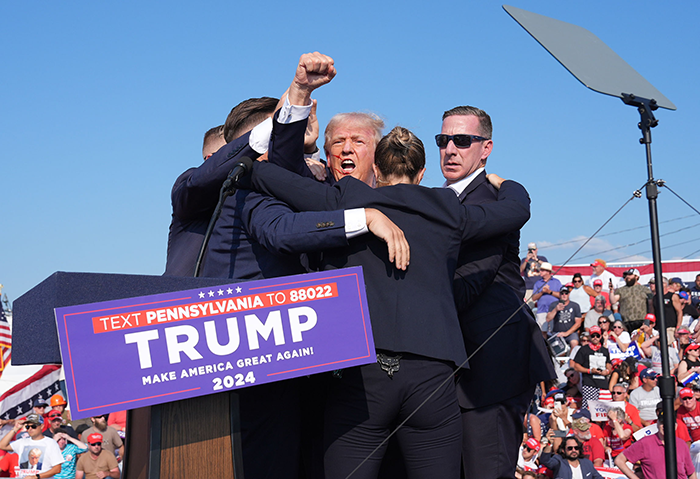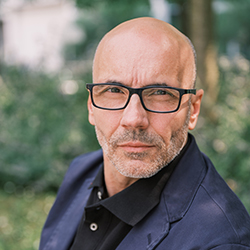New York Correspondences
15 July 2024
Trump, the Unlikely Icon of America

The bullet that killed Corey Comperatore, the 50-year-old firefighter struck down at Trump’s rally, like the one that, by outrageous luck, merely grazed the ear of the populist orator, has taken us from a surreal campaign — in which an elderly man who just confused Putin with Zelensky, his vice-president with his Republican opponent, insists he is still fit to be president until 2029 — into the realm of Shakespearean tragedy.
“There is something rotten in the state of Denmark,” says Marcellus, an officer, in Hamlet. “Something is rotten in the Republic of the United States of America,” a commentator might well have said on the evening of Sunday, 13 July, after the attempted assassination of the 45th President of the United States.
This drama unfolds against the backdrop of a bleak America, marked by decades of neoliberalism and still grappling with the aftershocks of the 2008 financial crisis and the Covid-19 pandemic. An America increasingly weakened by ethnic, cultural and religious divisions, where aspirations for autonomy — or even outright separatism — from certain territories and states are taken more seriously with each passing day.
Today, the American creed — adherence to a political system founded on the essential dignity of the individual; the fundamental equality of all men; the right to property — that once rallied diverse socio-economic groups around the Stars and Stripes, means little and resonates with few. In a country in crisis for several decades, where inequality is at record levels, where police violence is a daily reality, and where democracy is eroding year after year, the essential dignity of the individual and the fundamental equality of all men are no longer real concerns. As for social mobility, the lift has been out of order since the 1970s.
Hence the rapid fragmentation of American society into a patchwork of ethnic and social groups defending their own interests, no longer bound by shared values. Even the White Anglo-Saxon Protestants (WASPs), who arrived with the Mayflower and come closest to what might be considered an “original American people”, are no exception — now divided into multiple irreconcilable factions: “God’s madmen” versus deists and atheists, pro-life versus pro-choice, pro-gun versus gun-control advocates, LGBTQIA+ rights activists versus ultraconservatives, and so on.
In an America where dating sites proliferate for people of the same social class, skin colour, educational level or political leaning, everyone is now interested only in meeting and loving themselves in the mirror image of someone like them. Micro-communities made up of isolated individuals have replaced the nation.
It is on this fertile ground that a demagogue like Donald Trump built his political career. The Democrats and progressives, through their laxity, complacency and, in many cases, incompetence, paved the way for his rise. Incapable of responding effectively to the legitimate concerns of ordinary Americans, they often ignored the early warning signs of a society in crisis, preferring to focus on internal ideological battles or symbolic initiatives with no concrete impact.
Their economic policies, often detached from reality on the ground, failed to address growing inequalities or to revitalise regions devastated by deindustrialisation. The employment crisis — and let’s not be told about the precarious jobs created in recent years — the opioid epidemic and the rise in homelessness were all alarming signals they failed to treat with due seriousness. In terms of social justice, their inability to reform policing effectively and end police violence has left large segments of African-American and Latino populations feeling abandoned and betrayed.
Public health and education have likewise been poorly managed, with systems frequently underfunded and ill-suited to contemporary needs. Their sometimes dogmatic and elitist approach to reform has alienated a significant part of the electorate, which no longer feels represented or heard. In foreign policy, their lack of resolve and clear vision has led to costly and ineffective logistical or military interventions — as seen today in Ukraine or previously in Libya — as well as historic fiascos such as the rushed withdrawal from Afghanistan in 2021, exacerbating the public’s sense of impotence and decline. Their failure to deliver results has fuelled distrust in institutions and experts, creating fertile group for populism and conspiracy theories.
The senseless act committed by Thomas Matthew Crooks, the 20-year-old man who shot Donald Trump with a semi-automatic AR-15 or M16 rifle, has plunged America even deeper into chaos.
Instead of uniting Americans and their political class, the event immediately stoked anger and fed vitriolic partisan attacks. In the hours following the attack, numerous Republican officials and commentators accused Democrats of inciting the assassination attempt through their rhetoric. By comparing Trump to a would-be dictator, and portraying his return to power as the death knell for American institutions, they were, allegedly, indirectly responsible for the attack.
“For weeks, Democratic leaders have been fuelling ridiculous hysteria, claiming that Donald Trump’s re-election would mean the end of democracy in America,” said Steve Scalise, Republican Majority Leader in the House of Representatives, in a statement. “This incendiary rhetoric, spouted by far-left lunatics, must stop,” he added.
But is deep America capable of a wake-up call, of pulling itself together? The American people have often surprised observers with their ability to rebound from the worst crises. Yet many now find such a recovery difficult — and unlikely.
Martin Luther King Jr. is said to have remarked that America, born in violence and blood, can only perish in violence. After all, the history of the United States is the success story of a colonisation built on mass crimes and land seizure — a colonisation so successful that the colony became self-sufficient and broke away from its mother country. As if, for example, the settlers of Algeria had killed all the Arabs and then cut ties with France. Stories like that rarely end well.
As for Donald Trump, he emerges from this murderous episode stronger than ever. The image of him — bloodied, hair tousled, shirt open, raising his fist in defiance with the American flag billowing behind him — has already become iconic. It is as the presumptive, if not declared, winner of the November election that the New York billionaire has entered the Republican convention being held this week in Milwaukee.
Trump, “our new Founding Father”, as his fiercest supporters now call him.
——————————–
Romuald Sciora heads the Political and Geostrategic Observatory of the United States at IRIS, where he is an Associate Research Fellow. A Franco-American essayist and political scientist, he is the author of numerous books, articles and documentaries, and is a regular contributor to international media analysing current affairs. He lives in New York.

